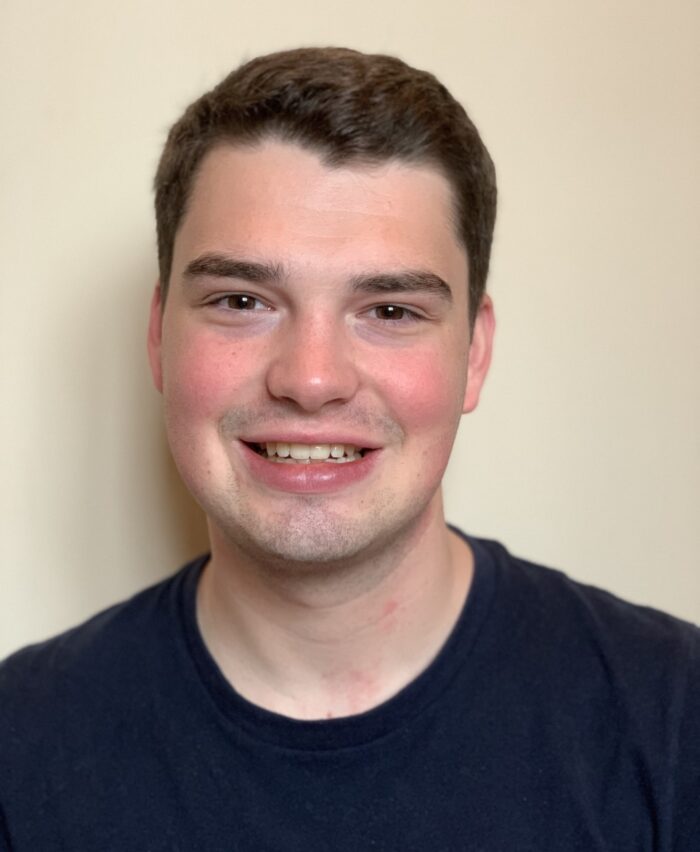LIFD Early Career Researcher Spotlight: Alexander Edwards

Thesis title: Transient Models to Assess Transmission and Control of Airborne Infection Risks in a Respiratory Ward
School/ Faculty: CDT in Fluid Dynamics, School of Computing
Supervisors: Prof. Catherine Noakes, Dr. Martín López-García, Dr. Marco-Felipe King, and Prof. Daniel Peckham
Tell us a bit about yourself:
I am currently in the 3rd year of the CDT in Fluid Dynamics, here at the University of Leeds. I completed my undergraduate degree in Mathematics at The University of Manchester, where I developed a keen interest in applied mathematics and fluid dynamics. My research interests include disease transmission, airflow and ventilation, indoor air quality, mathematical biology and epidemiology, and applications of these to clinical settings.
When I am not working, I enjoy playing the piano, and walking over the fields with my border collie, Bryn.
What is your research about?
I currently use a combination of mathematical models and airflow simulations to assess the transmission risks of airborne diseases on a UK respiratory ward. Airborne transmission is an infection route for many pathogens such as Influenza, TB and more recently COVID-19. Quantifying the infection risks associated with indoor activities in a variety of settings can help inform epidemiological understanding, and the implementation of effective mitigation strategies, particularly in hospitals where resources are limited and the consequences of infections amongst vulnerable people can be very severe.
The aim of my project is to develop transient multi-zone models that better represent healthcare settings such as an adult respiratory ward. Through the use of mathematical models, numerical modelling and airflow simulations, alongside the consideration of transient effects such as occupancy, weather, ventilation and disease settings, we aim to model the effects this has on the concentration of airborne pathogen, and consequent risk of infection. As the majority of UK hospital wards rely heavily on natural ventilation, there is particular focus on understanding the airflows within indoor environments and more specifically, the inter-zonal flows between spaces as these can vary significantly due to external weather conditions and occupant behaviour e.g. opening windows and doors within buildings. Further work may include the development of a stochastic model, both theoretically and numerically, to better capture the randomness of these outbreaks.
With continued engagement with Leeds Teaching Hospitals NHS Trust, and the development of more realistic models, we hope to provide a more accurate representation of the risk of airborne transmissions within hospital environments, which will lead to a better implementation of mitigation strategies, and a more efficient use of already scarce resources.
What did you wish you knew before starting a PhD?
Something I wish I had learnt sooner is that a PhD is a marathon not a sprint. It is more important to focus on being rigorous and producing high quality work, rather than worrying about making visible day-to-day progress. I quickly realised that doing a PhD is not just about the research and outputs, but also taking opportunities to network and build good connections, attending conferences or training around your research area, and taking time to explore alternative avenues of your work, even if it doesn’t work out.
Another important skill I have learnt since starting my PhD is reducing the emphasis of ‘perfection’. Within research and academia, there is always something more that can be done; you can always read an extra paper, or find another thing to change in a model, but acknowledging that what you have produced already is more than enough is even more valuable.
What are your plans for the future?
I still have over 12 months of my PhD left to complete, and so do not have any definite plans as of yet. I would like to continue developing the skills I have learnt throughout my PhD whether this be through further work in the same research area within academia, or starting a new challenge in industry.
